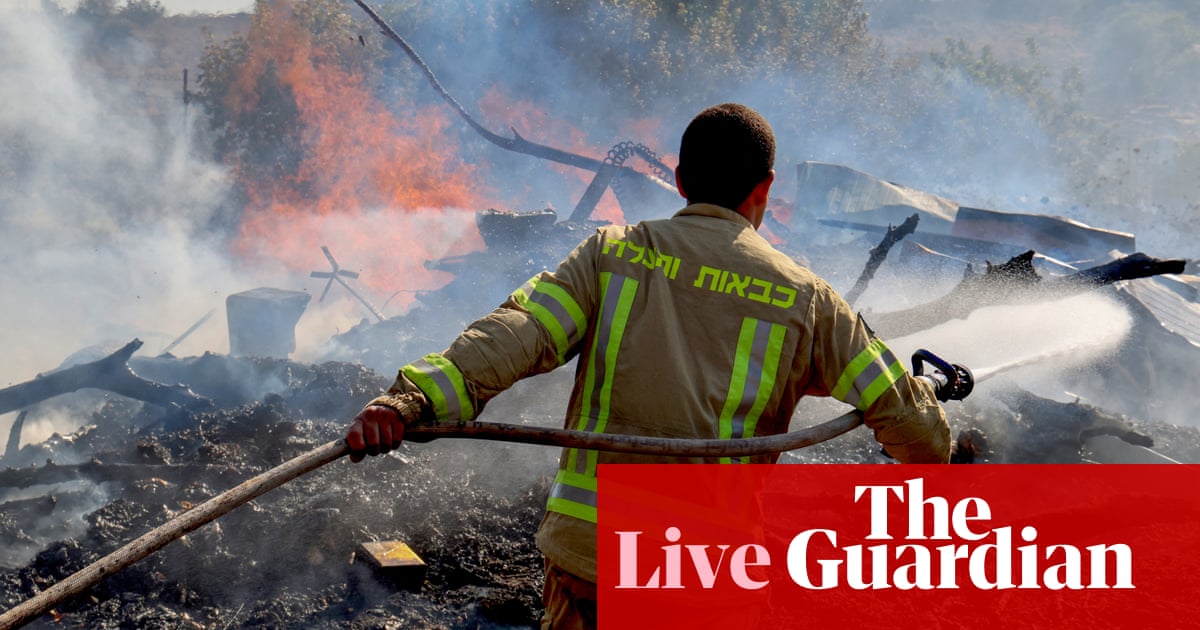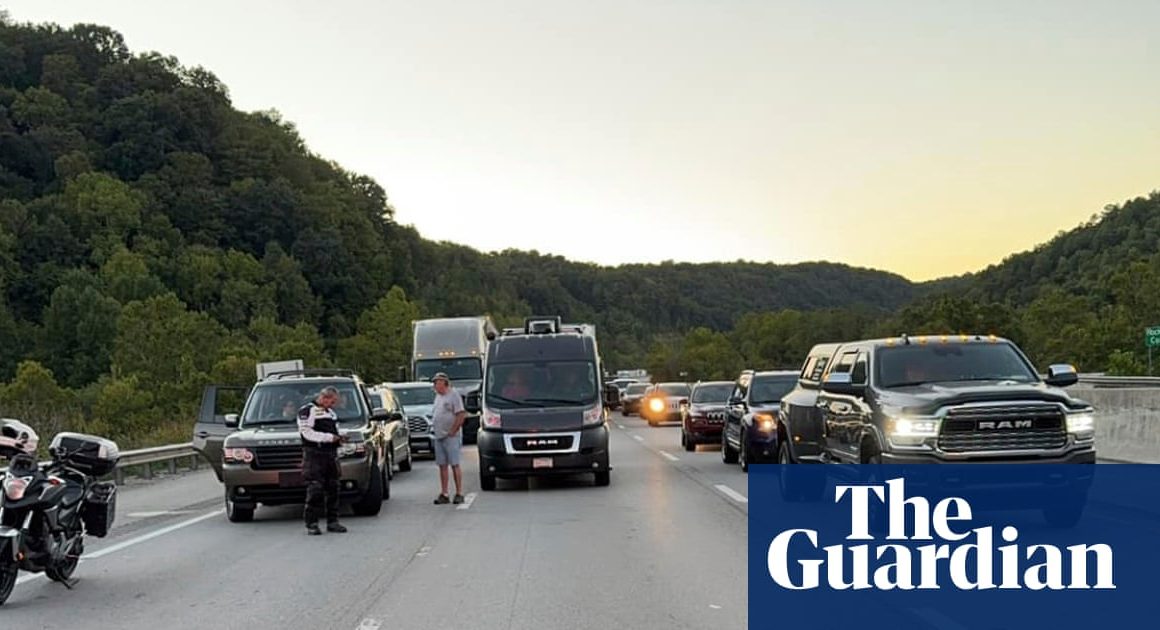Key events
The IDF has reported that aircraft infiltration sirens that sounded in northern Israel this morning were a false alarm.
Incident involving gunfire at US embassy in Beirut
There is some breaking news that small arms fire has been reported at the US embassy in Beirut. A suspect has been taken to hospital after forces opened fire. There are no reports of casualties among embassy staff.
More details soon â¦
The Palestine Red Crescent Society says it retrieved six bodies from a Palestinian house east of Deir al-Balah in the central Gaza Strip, after, it claimed, Israeli forces âtargeted several houses with artillery shells.â
The claims have not been independently verified.
Welcome and opening summary
Hello, welcome to our latest live blog on the Israel-Gaza war and the wider Middle East crisis. Iâm Martin Belam and Iâll be with you for the next while.
Israel says it is ready for an offensive along the northern border with Lebanon and is nearing a decision, the chief of staff said on Tuesday, according to Reuters.
It is as the Hezbollah movement said it was not seeking to widen the conflict but was ready to fight any war imposed on it.
Israeli military chief of general staff Herzi Halevi said in a recorded statement:
We are prepared after a very good process of training up to the level of a General Staff exercise to move to an offensive in the north,â he said in a recorded statement ⦠We are approaching a decision point.
Hezbollah deputy leader sheikh Naim Qassem told broadcaster Al Jazeera that the groupâs decision was not to widen the war but that it would fight one if it was imposed on it. Qassem said the Lebanon front would not stop until the Gaza war stops, Al Jazeera quoted him as saying.
The IDF says it struck two Hezbollah launchers in southern Lebanon overnight, as well as hitting three military structures.
The conflict between Hezbollah and Israel, which has been fought in parallel to the Gaza war, has intensified in recent days, adding to concerns that an even wider confrontation could break out between the heavily armed sides.
Meanwhile, US president Joe Biden is appearing to tone down his criticism of Israeli prime minister Benjamin Netanyahu, after saying that there is âevery reasonâ to draw the conclusion that Netanyahu is prolonging the war in Gaza for his own political self-preservation. Biden made the remarks in an interview with Time magazine published on Tuesday morning. Later on Tuesday, Biden was asked whether Netanyahu was âplaying politics with the warâ, and Biden said: âI donât think so. Heâs trying to work out a serious problem he has.â
More on that in a moment but first, a summary of the latest developments:
-
Israelâs prime minister, Benjamin Netanyahu, is facing growing pressure at home and internationally to support a new ceasefire plan for Gaza, a move he is resisting over fears it will collapse his government.
-
The Israeli prime minister said that Biden, in advancing a plan to wind down the war in Gaza, had published only some of the details. âThe war will be stopped for the purpose of returning hostages and then we will proceed with other discussions,â David Mencer, an Israeli government spokesperson, quoted Netanyahu as saying.
-
The Rafah border crossing critical to aid deliveries into Gaza from Egypt can not operate again unless Israel relinquishes control and hands it back to Palestinians on the Gaza side, Egyptian foreign minister Sameh Shoukry said. âIt is difficult for the Rafah crossing to continue operating without a Palestinian administration,â he said in a press conference with his Spanish counterpart in Madrid.
-
About 55% of all structures in the Gaza Strip have been destroyed, damaged or possibly damaged since the war erupted in October, according to preliminary satellite analysis by the UN. The analysis showed more than 137,000 buildings affected, according to Unosat, the UN satellite analysis agency.
-
Some people in Gaza are now reduced to drinking sewage water and eating animal feed, the WHOâs regional chief said Tuesday, pleading for increased aid access immediately to the besieged territory. Hanan Balkhy, the World Health Organizationâs Eastern Mediterranean regional director, also warned that the war between Israel and Hamas had a knock-on impact on healthcare across the wider region. The child health expert spoke to Agence France-Presse in an interview at the WHO headquarters in Geneva. Inside Gaza, âthere are people who are now eating animal food, eating grass, theyâre drinking sewage water,â she said. Children are barely able to eat, while the trucks are standing outside of Rafah.â
-
Franceâs President Emmanuel Macron on Tuesday told Israeli prime minister Benjamin Netanyahu that the Palestinian Authority should âensure the governanceâ of the Gaza Strip, the presidential office said. Macron in phone talks backed the proposal for a Gaza ceasefire and hostage release deal presented by US President Joe Biden, reports Agence France-Presse. âThis deal should reopen a credible perspective for the implementation of a two-state solution, the only one able to provide Israel with the necessary security guarantees and to respond to the legitimate aspirations of Palestinians,â he said.
-
Slovenia recognised a Palestinian state on Tuesday after its parliament voted overwhelmingly in favour of the move, reports Associated Press. âDear people of Palestine, todayâs final decision of Slovenia is a message of hope and peace,â Sloveniaâs Foreign Minister Tanja Fajon said on the social media platform X. âWe believe that only a two-state solution can lead to a lasting peace in the Middle East. Slovenia will tirelessly continue to work on the security of both nations, Palestinians and Israelis.â Sloveniaâs decision came days after Spain, Norway and Ireland recognised a Palestinian state, a move that was condemned by Israel.
-
A group of UN experts has called for all countries to recognise a Palestinian state to ensure peace in the Middle East. The experts, including the UN special rapporteur on the human rights situation in the Palestinian territories, said recognition of a Palestinian state was an important acknowledgment of the rights of the Palestinian people and their struggle towards freedom and independence.
-
The US House of Representatives voted Tuesday to advance a largely symbolic bill calling for sanctions on the international criminal court after its prosecutor applied for an arrest warrant against Israeli prime minister Benjamin Netanyahu.












